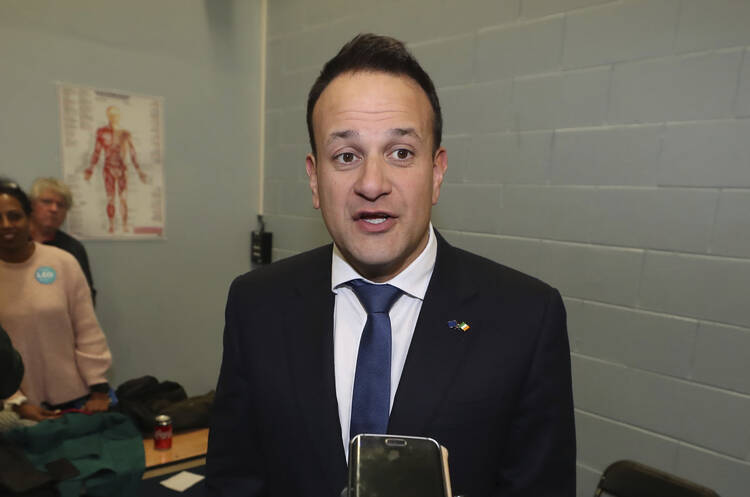DUBLIN (AP) — Ireland’s political parties were scrambling to adjust to a new reality Monday after an earth-shaking election that saw the left-wing nationalist party Sinn Fein win the biggest share of votes.
Sinn Fein, the party historically linked to the Irish Republican Army and its violent struggle for a united Ireland, received 24.5% of the first-preference votes in Saturday’s election. That bested Fianna Fail and Fine Gael, the two centrist parties that have governed Ireland since it won independence from Britain a century ago.
Fianna Fail received 22.2% of the votes and Fine Gael, the party of incumbent Prime Minister Leo Varadkar, got 20.9%.
Sinn Fein’s left-wing proposals for tackling Ireland's housing crisis and creaking healthcare system proved a powerful draw for young voters in a country that is still dealing with aftershocks of the 2008 global financial crisis, which hammered its debt-driven “Celtic Tiger” economy.
Vote counting was resuming Monday to fill all the seats in the 160-seat Dail, the lower house of Ireland’s parliament. Ireland uses a proportional-representation system in which voters rank candidates from first to last, with the lower preferences of elected or defeated candidates redistributed among their rivals.
With almost two-thirds of the seats in parliament filled, Sinn Fein had taken 36, Fianna Fail 21 and Fine Gael 19. With no party set to reach the 80 seats needed for a majority, some form of coalition appears inevitable. But forming a stable alliance looks tough.
Both Fianna Fail and Fine Gael said before the election that they would not go into a coalition with Sinn Fein because of its links to past violence.
Varadkar said Fine Gael’s stance was unchanged.
But as the scale of Sinn Fein’s surge became clear, Fianna Fail leader Micheal Martin said: “I’m a democrat.”
“I listen to the people. I respect the decision of the people,” he told Irish broadcaster RTE.
Sinn Fein leader Mary Lou McDonald suggested her party could try to form a government with the support of independents of smaller parties such as the Social Democrats and Labour.
“We want to talk to anyone who is interested in delivering a program for government, that is about getting to grips with the housing crisis and solving it, getting to grips with the crisis in health and giving families and workers a break and giving a new lease of life to government,” she said.
The IRA was responsible for murders, bombings and other violence for decades during decades of violence known as the “Troubles” in Northern Ireland. More than 3,500 people were killed in conflict between forces that sought to reunify Northern Ireland with the Republic of Ireland and those who wanted Northern Ireland to remain part of the U.K.
Supporters of Sinn Fein point out that it has been more than 20 years since Northern Ireland’s 1998 peace agreement and 15 years since the IRA announced the end of its violent campaign. Sinn Fein already sits in government in Northern Ireland as part of a power-sharing arrangement created by the peace process.
Fine Gael's third-place showing likely spells the end of the premiership of Varadkar, who has been Taoiseach, or prime minister, since 2017.
Ireland's youngest and first openly gay prime minister, Varadkar led Ireland during Britain’s lengthy divorce negotiations with the European Union. The outcome of those talks was crucial to Ireland, the only EU country to share a land border with the U.K.
Most people think Varadkar and his party handled Brexit well, securing guarantees that people and goods will continue to flow freely between Ireland and the north. But Brexit featured little in an election campaign dominated by domestic problems, especially a growing homelessness crisis, house prices that have risen faster than incomes and a public health system that hasn't kept up with demand.
Sinn Fein's triumph could have implications for Ireland and the U.K. The party's struggle for a united Ireland was on the back burner during the election, but the party is calling for a referendum on reunification within five years.
That is not something an Irish government can deliver without the support of Britain and Northern Ireland — highly unlikely in the short term. But Brexit looks likely to nudge Northern Ireland’s economy closer to that of its southern neighbor, and could increase pressure for a vote on unification.
In London, Prime Minister Boris Johnson's spokesman, James Slack, said the U.K. was “following the results of the Irish election carefully."
“The close relationship between the U.K. and Ireland will continue regardless of the election result,” he said.










